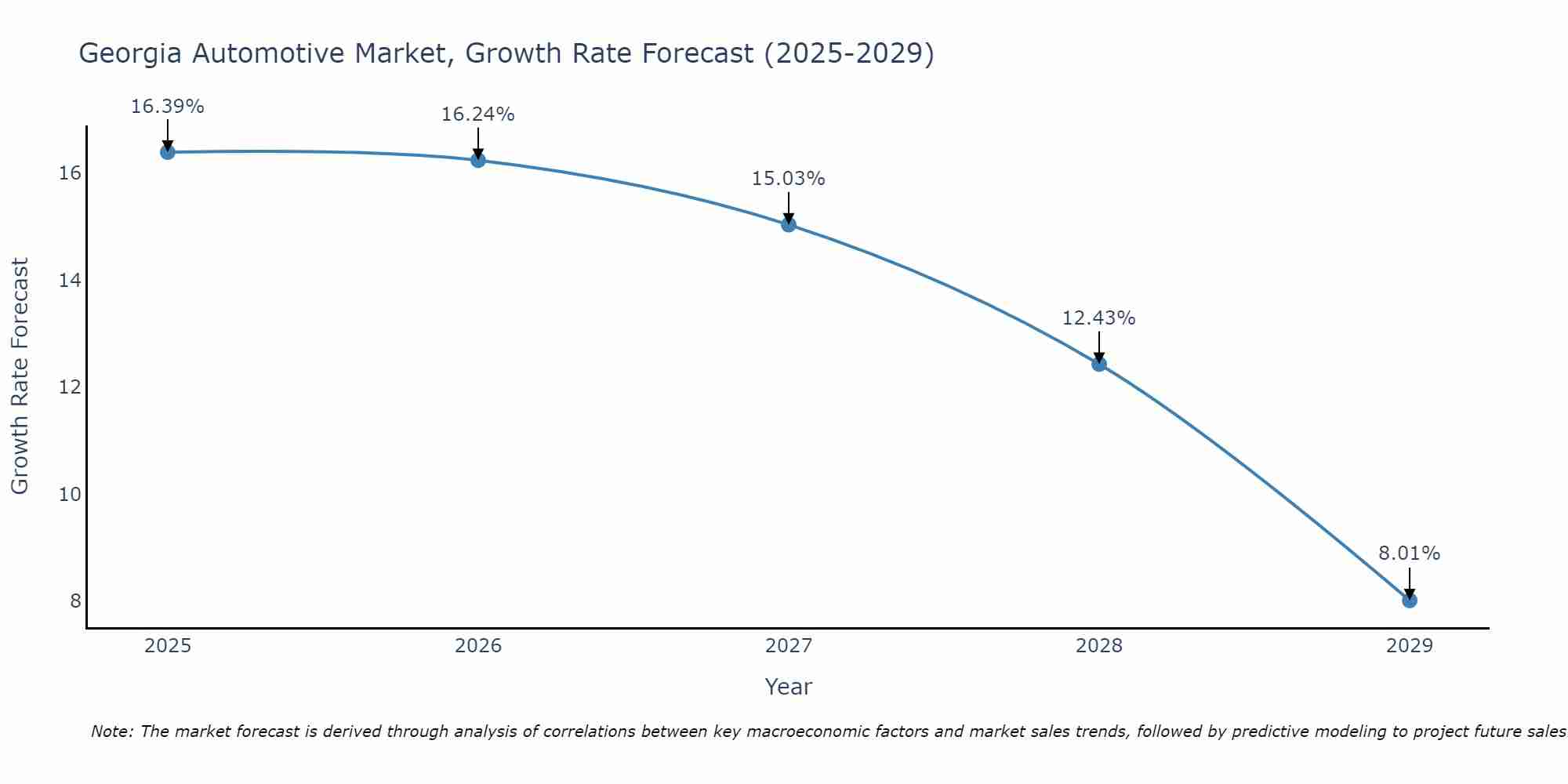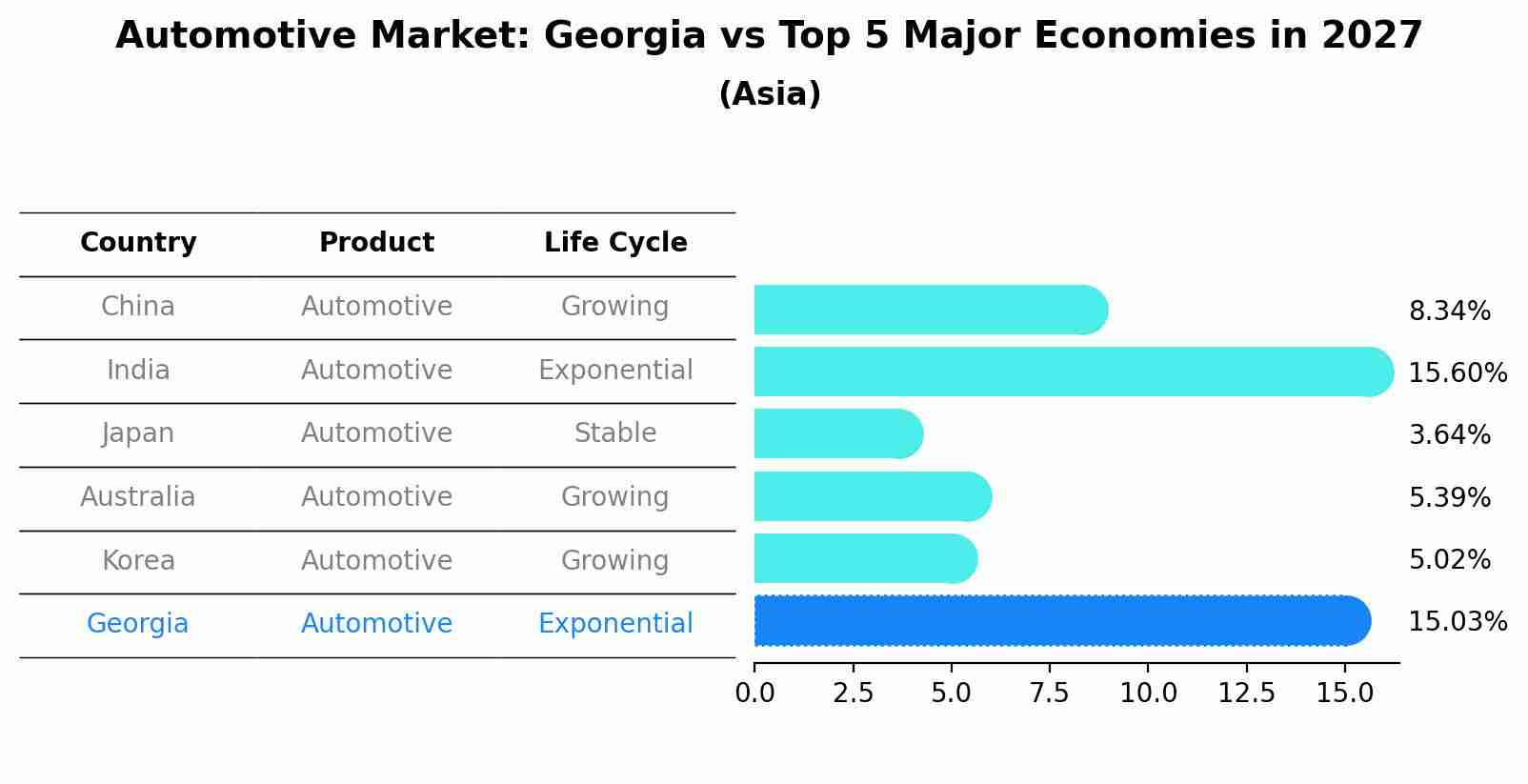Georgia Automotive Market Outlook | Size, Analysis, Revenue, Forecast, Share, COVID-19 IMPACT, Value, Growth, Companies, Industry & Trends
| Product Code: ETC431816 | Publication Date: Oct 2022 | Updated Date: Jul 2025 | Product Type: Market Research Report | |
| Publisher: 6Wresearch | Author: Shubham Deep | No. of Pages: 75 | No. of Figures: 35 | No. of Tables: 20 |
Georgia Automotive Market Size Growth Rate
The Georgia Automotive Market could see a tapering of growth rates over 2025 to 2029. Starting high at 16.39% in 2025, the market steadily declines to 8.01% by 2029.

Automotive Market: Georgia vs Top 5 Major Economies in 2027 (Asia)
By 2027, the Automotive market in Georgia is anticipated to reach a growth rate of 15.03%, as part of an increasingly competitive Asia region, where China remains at the forefront, supported by India, Japan, Australia and South Korea, driving innovations and market adoption across sectors.

Georgia Automotive Market Synopsis
The Georgia Automotive Market is a dynamic and competitive industry characterized by a diverse range of vehicle types and consumer preferences. With a strong presence of major automotive manufacturers and dealerships, the market offers a wide selection of both new and used vehicles to meet the varying needs of customers. Atlanta, as the state`s largest city and economic hub, serves as a key location for automotive sales and services. The market is also influenced by factors such as changing consumer trends, technological advancements in vehicle design, and environmental considerations driving the demand for electric and hybrid vehicles. Additionally, Georgia`s favorable business environment and infrastructure investments contribute to the overall growth and development of the automotive industry in the state.
Georgia Automotive Market Trends
The Georgia Automotive Market is currently experiencing several key trends. One significant trend is the growing demand for electric vehicles (EVs) and hybrid cars, driven by increasing environmental awareness and government incentives for clean energy vehicles. Another trend is the rising popularity of SUVs and trucks, reflecting consumer preferences for larger and more versatile vehicles. Additionally, there is a focus on advanced driver-assistance systems (ADAS) and autonomous driving technology in new car models, emphasizing safety and convenience features. The market also sees a shift towards online car shopping and digital retail experiences, with more consumers turning to e-commerce platforms to research and purchase vehicles. Overall, these trends indicate a shift towards sustainable, technologically advanced, and digitally integrated automotive offerings in Georgia.
Georgia Automotive Market Challenges
The Georgia Automotive Market faces challenges such as increasing competition among dealerships, fluctuating consumer demand due to economic conditions, and the need to adapt to rapidly evolving technology in vehicles. Additionally, the industry must navigate stringent environmental regulations and sustainability concerns, leading to the increased emphasis on electric and hybrid vehicles. Infrastructure limitations for electric vehicle charging stations also present a hurdle for wider adoption in the state. Moreover, the automotive market in Georgia must manage supply chain disruptions and rising material costs, impacting production and pricing strategies. Overall, the industry in Georgia must remain agile and innovative to address these challenges and stay competitive in the evolving automotive landscape.
Georgia Automotive Market Investment Opportunities
The Georgia Automotive Market offers several investment opportunities, including the growth of electric vehicles (EVs). With the state`s commitment to sustainability and infrastructure development for EVs, there is a rising demand for electric vehicles and related technology. Investing in EV charging stations, battery technology, and EV manufacturing facilities in Georgia could prove to be lucrative. Additionally, Georgia`s strategic location as a hub for automotive production and logistics makes it attractive for companies looking to expand or establish a presence in the Southeastern United States. Investing in research and development of autonomous vehicles and connected car technologies could also be promising, given the state`s efforts to promote innovation in the automotive industry. Overall, the Georgia Automotive Market presents diverse investment opportunities for forward-thinking investors.
Jordan Agar Market Government Policies
The Georgia Automotive Market is influenced by several government policies aimed at promoting electric vehicles (EVs) and reducing emissions. The state offers various incentives, such as tax credits and rebates, to encourage the adoption of EVs. Additionally, Georgia has implemented regulations to reduce greenhouse gas emissions from vehicles, including emissions testing requirements and stringent fuel efficiency standards. The state also supports infrastructure development for EV charging stations through grants and partnerships with private companies. Overall, Georgia`s government policies focus on promoting sustainable transportation options, reducing air pollution, and supporting the growth of the EV market in the state.
Georgia Automotive Market Future Outlook
The Georgia Automotive Market is expected to experience steady growth in the coming years due to factors such as increasing population, rising disposable income levels, and a growing demand for electric vehicles. The state`s favorable business environment, strong infrastructure, and proximity to major automotive manufacturing hubs will continue to attract investments from leading automotive companies. Additionally, the shift towards sustainable and connected vehicles is likely to drive innovation and technological advancements in the market. However, challenges such as changing consumer preferences, regulatory changes, and supply chain disruptions may impact the market dynamics. Overall, the Georgia Automotive Market is poised for expansion, with opportunities for growth in both traditional and emerging segments of the industry.
Key Highlights of the Report:
- Georgia Automotive Market Outlook
- Market Size of Georgia Automotive Market, 2021
- Forecast of Georgia Automotive Market, 2031
- Historical Data and Forecast of Georgia Automotive Revenues & Volume for the Period 2018 - 2031
- Georgia Automotive Market Trend Evolution
- Georgia Automotive Market Drivers and Challenges
- Georgia Automotive Price Trends
- Georgia Automotive Porter's Five Forces
- Georgia Automotive Industry Life Cycle
- Historical Data and Forecast of Georgia Automotive Market Revenues & Volume By Product Type for the Period 2018 - 2031
- Historical Data and Forecast of Georgia Automotive Market Revenues & Volume By Electric for the Period 2018 - 2031
- Historical Data and Forecast of Georgia Automotive Market Revenues & Volume By Hybrid Electric for the Period 2018 - 2031
- Historical Data and Forecast of Georgia Automotive Market Revenues & Volume By Plug-In Hybrid Electric for the Period 2018 - 2031
- Historical Data and Forecast of Georgia Automotive Market Revenues & Volume By Mild Hybrid for the Period 2018 - 2031
- Historical Data and Forecast of Georgia Automotive Market Revenues & Volume By Natural Gas for the Period 2018 - 2031
- Historical Data and Forecast of Georgia Automotive Market Revenues & Volume By Fuel Cell Electric for the Period 2018 - 2031
- Historical Data and Forecast of Georgia Automotive Market Revenues & Volume By Diesel for the Period 2018 - 2031
- Historical Data and Forecast of Georgia Electric Automotive Market Revenues & Volume By Petrol for the Period 2018 - 2031
- Georgia Automotive Import Export Trade Statistics
- Market Opportunity Assessment By Product Type
- Georgia Automotive Top Companies Market Share
- Georgia Automotive Competitive Benchmarking By Technical and Operational Parameters
- Georgia Automotive Company Profiles
- Georgia Automotive Key Strategic Recommendations
Frequently Asked Questions About the Market Study (FAQs):
- Single User License$ 1,995
- Department License$ 2,400
- Site License$ 3,120
- Global License$ 3,795
Search
Thought Leadership and Analyst Meet
Our Clients
Related Reports
- Afghanistan Rocking Chairs And Adirondack Chairs Market (2026-2032) | Size & Revenue, Competitive Landscape, Share, Segmentation, Industry, Value, Outlook, Analysis, Trends, Growth, Forecast, Companies
- Afghanistan Apparel Market (2026-2032) | Growth, Outlook, Industry, Segmentation, Forecast, Size, Companies, Trends, Value, Share, Analysis & Revenue
- Canada Oil and Gas Market (2026-2032) | Share, Segmentation, Value, Industry, Trends, Forecast, Analysis, Size & Revenue, Growth, Competitive Landscape, Outlook, Companies
- Germany Breakfast Food Market (2026-2032) | Industry, Share, Growth, Size, Companies, Value, Analysis, Revenue, Trends, Forecast & Outlook
- Australia Briquette Market (2025-2031) | Growth, Size, Revenue, Forecast, Analysis, Trends, Value, Share, Industry & Companies
- Vietnam System Integrator Market (2025-2031) | Size, Companies, Analysis, Industry, Value, Forecast, Growth, Trends, Revenue & Share
- ASEAN and Thailand Brain Health Supplements Market (2025-2031) | Strategy, Consumer Insights, Analysis, Investment Trends, Opportunities, Growth, Size, Share, Industry, Revenue, Segments, Value, Segmentation, Supply, Forecast, Restraints, Outlook, Competition, Drivers, Trends, Demand, Pricing Analysis, Competitive, Strategic Insights, Companies, Challenges
- ASEAN Bearings Market (2025-2031) | Strategy, Consumer Insights, Analysis, Investment Trends, Opportunities, Growth, Size, Share, Industry, Revenue, Segments, Value, Segmentation, Supply, Forecast, Restraints, Outlook, Competition, Drivers, Trends, Demand, Pricing Analysis, Competitive, Strategic Insights, Companies, Challenges
- Europe Flooring Market (2025-2031) | Outlook, Share, Industry, Trends, Forecast, Companies, Revenue, Size, Analysis, Growth & Value
- Saudi Arabia Manlift Market (2025-2031) | Outlook, Size, Growth, Trends, Companies, Industry, Revenue, Value, Share, Forecast & Analysis
Industry Events and Analyst Meet
Whitepaper
- Middle East & Africa Commercial Security Market Click here to view more.
- Middle East & Africa Fire Safety Systems & Equipment Market Click here to view more.
- GCC Drone Market Click here to view more.
- Middle East Lighting Fixture Market Click here to view more.
- GCC Physical & Perimeter Security Market Click here to view more.
6WResearch In News
- Doha a strategic location for EV manufacturing hub: IPA Qatar
- Demand for luxury TVs surging in the GCC, says Samsung
- Empowering Growth: The Thriving Journey of Bangladesh’s Cable Industry
- Demand for luxury TVs surging in the GCC, says Samsung
- Video call with a traditional healer? Once unthinkable, it’s now common in South Africa
- Intelligent Buildings To Smooth GCC’s Path To Net Zero


















